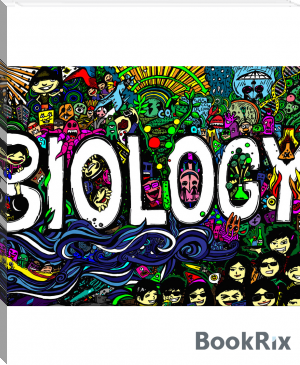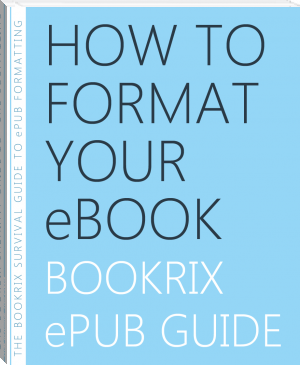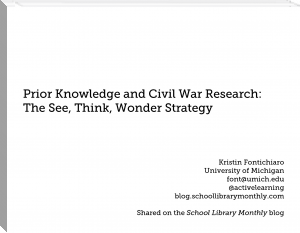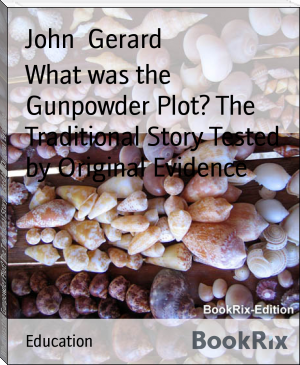Ms - Eleanora Robinson (read aloud books txt) 📗

- Author: Eleanora Robinson
Book online «Ms - Eleanora Robinson (read aloud books txt) 📗». Author Eleanora Robinson
A Biology paper is a science paper. This means that the APA style of formatting is used when writing biology papers. There are several subjects in biology paper writing. The two major subjects are botany and zoology. Botany is the study of plants while zoology is the detailed study of animals.
Before writing a biology paper, a student needs to select a biology topic. It is essential for a student to have knowledge of what he or she wants to write about. Thorough reading and research is also necessary. This will help the student to come up with an original biology paper that will earn a fair grade. There are so many topics that students can write biology papers on. Hence, it is essential for a student to choose a topic that interests him or her. By doing that, the student will be sure of writing a biology paper that will capture the attention of the reader.
There are so many types of biology papers. They include: Biology essays, biology term papers, biology dissertations and biology theses. The steps of writing a biology paper like a biology essay are as follows: The first step is for the biology Paper writer to choose a research question. The question needs to be relevant, appropriate and interesting. It is essential for a student to write biology paper based on the topic that he or she is familiar with. This will help the student to feel more comfortable when writing the biology paper. The second step is to form the biology paper’s outline. Creating an outline is essential to biology paper writers who are just beginning to learn how to write biology papers. The outline consists of the points that are relevant. It helps biology paper writers to remember including all important information in their biology papers. The third step is to write the biology paper. This is the main body of the paper, and it contains all the relevant information. The last step is to write the conclusion. The conclusion summarizes all the important points of the biology paper.
Before submitting a biology paper it is essential to proofread it. This is done in order to minimize grammatical and spelling mistakes.
Students find it hard writing their own biology papers. Such students should seek help from a writing service like the "help write my paper" that can produce quality biology papers. The writing service needs to follow the guidelines given by teachers. The writers need to be professionals, and should have experience in writing biology dissertations, biology thesis and biology term papers. The company should offer a variety of biology papers in different educational levels such as, high school, university and doctoral level.
Biology essay writing is among the most effective ways to check the student’s knowledge in biology. Several students face problems in writing biology essays. This problem can be solved by seeking a professional biology essay help. A reliable biology papers writing company should help all students who need to write biology papers based on any topic. The company should complete a biology paper within the deadline specified by a student. The Academic writers should be conversant with all biology topics. They should have knowledge of writing biology papers in any given topic. The custom written biology papers should be original and non-plagiarized.
Our company is best writing company to contact for professional biology papers writing assistance.
Writing
An essay is, generally, a piece of writing that gives the author's own argument — but the definition is vague, overlapping with those of a paper, an article, a pamphlet, and a short story. Essays have traditionally been sub-classified as formal and informal. Formal essays are characterized by "serious purpose, dignity, logical organization, length," whereas the informal essay is characterized by "the personal element (self-revelation, individual tastes and experiences, confidential manner), humor, graceful style, rambling structure, unconventionality or novelty of theme," etc.[1]
Essays are commonly used as literary criticism, political manifestos, learned arguments, observations of daily life, recollections, and reflections of the author. Almost all modern essays are written in prose, but works in verse have been dubbed essays (e.g., Alexander Pope's An Essay on Criticism and An Essay on Man). While brevity usually defines an essay, voluminous works like John Locke's An Essay Concerning Human Understanding and Thomas Malthus's An Essay on the Principle of Population are counterexamples.
In some countries (e.g., the United States and Canada), essays have become a major part of formal education. Secondary students are taught structured essay formats to improve their writing skills; admission essays are often used by universities in selecting applicants, and in the humanities and social sciences essays are often used as a way of assessing the performance of students during final exams.
The concept of an "essay" has been extended to other media beyond writing. A film essay is a movie that often incorporates documentary filmmaking styles and focuses more on the evolution of a theme or idea. A photographic essay covers a topic with a linked series of photographs that may have accompanying text or captions.
DefinitionsJohn Locke's 1690 An Essay Concerning Human Understanding.
The word essay derives from the French infinitive essayer, "to try" or "to attempt". In English essay first meant "a trial" or "an attempt", and this is still an alternative meaning. The Frenchman Michel de Montaigne (1533–1592) was the first author to describe his work as essays; he used the term to characterize these as "attempts" to put his thoughts into writing.
Subsequently, essay has been defined in a variety of ways. One definition is a "prose composition with a focused subject of discussion" or a "long, systematic discourse".[2] It is difficult to define the genre into which essays fall. Aldous Huxley, a leading essayist, gives guidance on the subject.[3] He notes that "the essay is a literary device for saying almost everything about almost anything", and adds that "by tradition, almost by definition, the essay is a short piece". Furthermore, Huxley argues that "essays belong to a literary species whose extreme variability can be studied most effectively within a three-poled frame of reference". These three poles (or worlds in which the essay may exist) are:
The personal and the autobiographical: The essayists that feel most comfortable in this pole "write fragments of reflective autobiography and look at the world through the keyhole of anecdote and description". The objective, the factual, and the concrete particular: The essayists that write from this pole "do not speak directly of themselves, but turn their attention outward to some literary or scientific or political theme. Their art consists of setting forth, passing judgment upon, and drawing general conclusions from the relevant data". The abstract-universal: In this pole "we find those essayists who do their work in the world of high abstractions", who are never personal and who seldom mention the particular facts of experience.Huxley adds that the most satisfying essays "...make the best not of one, not of two, but of all the three worlds in which it is possible for the essay to exist."
Montaigne
Montaigne's "attempts" grew out of his commonplacing.[4] Inspired in particular by the works of Plutarch, a translation of whose Œuvres Morales (Moral works) into French had just been published by Jacques Amyot, Montaigne began to compose his essays in 1572; the first edition, entitled Essais, was published in two volumes in 1580.[5] For the rest of his life, he continued revising previously published essays and composing new ones. A third volume was published posthumously; together, their over 100 examples are widely regarded as the predecessor of the modern essay.
Europe
While Montaigne's philosophy was admired and copied in France, none of his most immediate disciples tried to write essays. But Montaigne, who liked to fancy that his family (the Eyquem line) was of English extraction, had spoken of the English people as his "cousins", and he was early read in England, notably by Francis Bacon.[6]
Bacon's essays, published in book form in 1597 (only five years after the death of Montaigne, containing the first ten of his essays),[6] 1612, and 1625, were the first works in English that described themselves as essays. Ben Jonson first used the word essayist in 1609, according to the Oxford English Dictionary. Other English essayists included Sir William Cornwallis, who published essays in 1600 and 1617 that were popular at the time,[6] Robert Burton (1577–1641) and Sir Thomas Browne (1605–1682). In Italy, Baldassare Castiglione wrote about courtly manners in his essay Il Cortigiano. In the 17th century, the Spanish Jesuit Baltasar Gracián wrote about the theme of wisdom.[7]
In England, during the Age of Enlightenment, essays were a favored tool of polemicists who aimed at convincing readers of their position; they also featured heavily in the rise of periodical literature, as seen in the works of Joseph Addison, Richard Steele and Samuel Johnson. Addison and Steele used the journal Tatler (founded in 1709 by Steele) and its successors as storehouses of their work, and they became the most celebrated eighteenth-century essayists in England. Johnson's essays appear during the 1750s in various similar publications.[6] As a result of the focus on journals, the term also acquired a meaning synonymous with "article", although the content may not the strict definition. On the other hand, Locke's An Essay Concerning Human Understanding is not an essay at all, or cluster of essays, in the technical sense, but still it refers to the experimental and tentative nature of the inquiry which the philosopher was undertaking.[6]
In the





Comments (0)